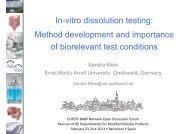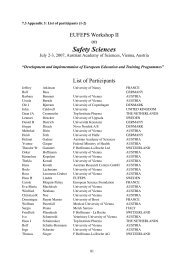2011 Anniversary Yearbook - EUFEPS today and history
2011 Anniversary Yearbook - EUFEPS today and history
2011 Anniversary Yearbook - EUFEPS today and history
Create successful ePaper yourself
Turn your PDF publications into a flip-book with our unique Google optimized e-Paper software.
<strong>EUFEPS</strong> Newsletter, 2005, vol. 14, issue 3<br />
The Role of Learned Societies<br />
in Forming a European<br />
Technology Platform for<br />
Innovative Medicines<br />
Christian R. Noe, Professor, <strong>EUFEPS</strong> President<br />
Ole J. Bjerrum, Professor, <strong>EUFEPS</strong> Past-President<br />
At the <strong>EUFEPS</strong>-initiated workshop<br />
on “How to Establish a European<br />
Technology Platform for Innovative<br />
Medicines”, held in Barcelona April<br />
21–22 2005, six lectures were given by<br />
delegates from European organisations<br />
representing academia, clinical sector,<br />
biotech SME’s, regulatory, learned<br />
societies <strong>and</strong> patients. We feel that the<br />
views of learned societies, put into a<br />
<strong>EUFEPS</strong> perspective, have a general<br />
interest for our readers.<br />
The scene<br />
The present ‘European crisis’ in drug R&D<br />
is characterised by following trends: the<br />
pharmaceutical industry is moving out of<br />
Europe <strong>and</strong> financial support of the existing<br />
health system is becoming increasingly<br />
difficult. Each national pharmaceutical<br />
sector is too fragmented to be seen as one<br />
‘community’ <strong>and</strong> one ‘market’. In addition,<br />
the financing of academic research is<br />
disastrous in many countries, <strong>and</strong> the<br />
universities are going through fundamental<br />
reforms, which have unclear outcomes.<br />
Hence there are challenges for strategic<br />
planning in drug research, as well as for<br />
implementation <strong>and</strong> financial implications.<br />
Complexity of the task<br />
The ‘Tower of Babel’ problem arises<br />
because different disciplines have<br />
different scientific cultures <strong>and</strong> languages,<br />
<strong>and</strong> the ‘players’ involved in the various<br />
phases <strong>and</strong> fields of drug research do not<br />
recognise, underst<strong>and</strong> <strong>and</strong> respect each<br />
other sufficiently. Thus there is much need<br />
for interdisciplinary <strong>and</strong> trans-disciplinary<br />
components in drug R&D.<br />
A superficial view of the drug R&D<br />
process makes it appear linear from<br />
target discovery ➞ lead discovery ➞<br />
lead optimisation ➞ drug development<br />
➞ marketed drugs. It is well known,<br />
however, that this is by no means the case.<br />
As pointed out in, for example, the New<br />
Safe Medicines Faster concept, innovative<br />
strategies that combine discovery <strong>and</strong><br />
development are needed to cultivate drug<br />
discovery. Furthermore, the complexity<br />
of pharmaceutical science processes or<br />
systems is ever increasing (Figure 2).<br />
Obviously, pharmaceutical science is the<br />
core discipline, along with biology <strong>and</strong><br />
economics.<br />
Figure 2. Complexity of disciplines in the drug R&D process<br />
Pharmaceutical Science: a scientific core discipline<br />
It covers: Finance; Molecular Biology; Genetics; Transgenic Animal Pharmacology;<br />
Cell Biology; Biochemistry; Bioinformatics; Computational Biology; Structural<br />
Biology; Pharmacoinformatics; Medicinal Chemistry; Molecular Pharmacology;<br />
Molecular Modelling; Physical Chemistry; Analytical Chemistry; Biotechnology;<br />
Pharmaceutical Biology; Pharmacognosy; Functional Pharmacology; Law<br />
(Intellectual Properties); Regulatory Science; Toxicology; Pharmacokinetics;<br />
Statistics; Galenics; Pharmaceutical Technology; Nanotechnology; Pharmaceutical<br />
Analysis; Quality Assurance; Physiology; Radiopharmacy; Biopharmaceutical<br />
Sciences; ADME-Research; Animal Pharmacology; Clinical Chemistry; Clinical<br />
Pharmacy; Pharmaceutical Medicine; Clinical Pharmacology; Nuclear Medicine;<br />
Medical Clinical Sciences; Process Engineering; Plant Engineering; Project<br />
Management; Marketing; Public Relations; Human Resources Management;<br />
Ethics; Logistics, etc.<br />
XLVI<br />
Christian Noe, Professor<br />
The Mission <strong>and</strong> Task of the<br />
European Technology Platform<br />
As we see it, the mission of the European<br />
Technology Platform for Innovative<br />
Medicines should be:<br />
• To work out novel strategies to prevent<br />
<strong>and</strong> treat diseases efficiently<br />
• To speed up the process of drug<br />
discovery <strong>and</strong> development while<br />
focusing on efficacy <strong>and</strong> safety<br />
• To utilise the fruits of 25 years of<br />
(molecular) biology-driven life sciences<br />
research: e.g. personalised medicines to<br />
prevent <strong>and</strong> treat common as well as<br />
rare (orphan) diseases<br />
Thus, the European task would include:<br />
• How to create a spirit <strong>and</strong> enthusiasm<br />
for European drug research<br />
• How to generate a ‘European<br />
Community of Drug Researchers’ by<br />
reducing fragmentation, be it political,<br />
national, organisational or scientific<br />
• How to build up a unified European<br />
pharmaceutical sector by bringing<br />
together all stakeholders involved in<br />
drug R&D<br />
• How to generate one European market<br />
for medicines by harmonising activities<br />
The Role of learned societies<br />
The involvement of learned societies<br />
in drug R&D may well represent a<br />
straightforward tool for fast development<br />
of a European Technology Platform for<br />
Innovative Medicines. It would facilitate<br />
implementation if relevant societies, as<br />
stakeholders, would organise themselves<br />
into e.g. a ‘European Pharmaceutical<br />
Sciences Forum’, where the complex<br />
matrix <strong>and</strong> network of societies will be<br />
harmonised <strong>and</strong> utilised at the European<br />
level.




